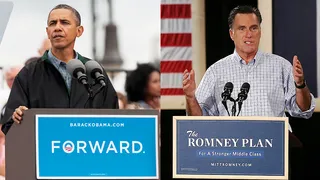Memorable Campaign Slogans
Campaign slogans must be convincing, most of all.

1 / 11
What Makes a Good Campaign Slogan? - There's more to an effective campaign slogan than being catchy, although that helps, too. As Democratic consultant Jamal Simmons explains, it must meet the four Cs of messaging and be clear, concise, contrasting and convincing. In 2008, then Sen. Obama chose hope and change to highlight the differences between himself and opponent Sen. John McCain. "It was a subtle play on McCain's age and his politics," Simmons says. In 2012, Mitt Romney's campaign slogan hints of recapturing an era of greatness past, Simmons adds, while Obama once again seeks to evoke the future. —Joyce Jones(Photos from left: Julie Denesha/Getty Images, Justin Sullivan/Getty Images)
Photo By Julie Denesha/Getty Images, Justin Sullivan/Getty Images

2 / 11
Dwight Eisenhower, 1952: I Like Ike - Famous composer Irving Berlin wrote the campaign song for Eisenhower featuring the slogan "I Like Ike," (his nickname). It was a way for voters to express their trust in and comfort with the Army general. (Photo: Courtesy of The Dwight D. Eisenhower Campaign)

3 / 11
John F. Kennedy, 1960: A Time for Greatness - Like Barack Obama decades later, Jack Kennedy was not your daddy's presidential candidate. The Massachusetts senator was handsome and dashing and inspired both passion and purpose in a younger generation, a stark contrast to his opponent, the rather dour then-Vice President Richard Nixon. While Nixon asked voters to choose the candidate with the most experience, Kennedy dared them to dream. (Photo: John F. Kennedy Campaign)

4 / 11
Jesse Jackson Sr., 1988: Keep Hope Alive! - "Keep Hope Alive" was Jackson's admonition to Americans, and African-Americans in particular, to never forget the nation's, and their own, potential for greatness even in the face of adversity.(Photo: Jesse Jackson Sr. Campaign)

5 / 11
Bill Clinton, 1992: It's the Economy, Stupid - Campaign strategist James Carville coined and made famous the slogan "It's the Economy, Stupid," during Clinton's 1992 race to serve as a reminder of what mattered most to Americans that election year. (Photo: Bill Clinton Campaign)
ADVERTISEMENT

6 / 11
Al Gore, 2000: Prosperity and Progress - Vice President Al Gore during his 2000 White House bid mistakenly tried to distance himself from President Clinton, but he chose a slogan that highlighted the unprecedented economic growth the nation experienced under the Clinton-Gore administration and his plan to keep it moving forward. (Photo: Al Gore Campaign)

7 / 11
George W. Bush, 2000: Compassionate Conservative - George W. Bush used the phrase compassionate conservatism to describe his beliefs and traditional conservative ideals and an alleged commitment to help the less fortunate. "It is compassionate to actively help our citizens in need. It is conservative to insist on accountability and results," he said.

8 / 11
Barack Obama, 2008: Yes We Can! - As the president frequently says in stump speeches, few imagined in 2008 that the United States would elect an African-American with a name like Barack Obama, especially at a time when the nation was experiencing financial turmoil and divided over U.S. engagement in the Middle East. But he ignited a spirit of hope and change not felt since the Kennedy era, giving truth to his mantra, "Yes, We Can!" (Photo: Barack Obama Campaign)

9 / 11
John McCain, 2008: Country First - Arizona Sen. John McCain chose a slogan that represented his military family background; wartime experience that included five years as a POW in North Vietnam; and longtime public service record to send the message that throughout his life he has put his country first. (Photo: David Greedy/Getty Images)

10 / 11
Mitt Romney, 2012: Believe in America - Romney's slogan is an attempt to highlight what he views as a fundamental difference between himself and Obama, who the Republican has accused of having little faith in the nation's economic system and spirit of individual innovation and appeasing its enemies. (Photo: Mitt Romney Campaign)
